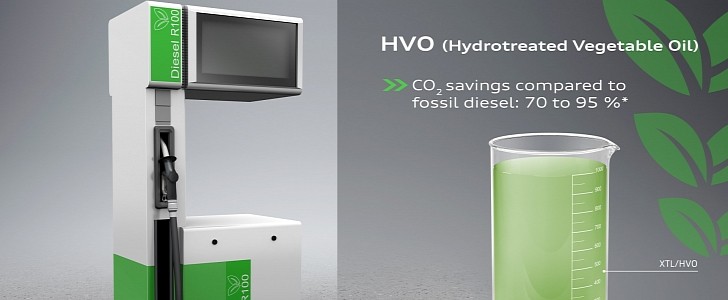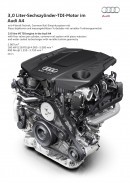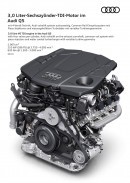Audi has announced it has approved many of its current six-cylinder diesel engines to run on a new type of fuel, called HVO. The latter is short for Hydrotreated Vegetable Oil, and it is a renewable and sustainable fuel.
For now, Audi's V6 diesel engines that provide up to 210 kW (286 metric horsepower) that left the company's factories beginning from the middle of February 2022 are eligible to operate with the new HVO fuel. HVO is in accordance with European standard EN 15940 and it allows for a 70 to 95 percent reduction of CO2 emissions when compared to fossil-sourced diesel fuel.
Audi also noted that HVO has a higher cetane rating than conventional diesel, which means that the new fuel is more efficient than conventional fuel. The cetane rating of HVO has not been specified, but Audi claims there is an increase of almost 30 percent, which is a massive boost, and its benefits are said to be particularly noticeable during cold starts. We should point out that the former is our opinion, while the latter is a remark from Audi.
The new sustainable fuel is obtained from biological residual and waste materials, such as waste cooking oil, agricultural residues, and other oils are incorporated with hydrogen, and the resulting process is called hydrogenation. The result is described by scientists at aliphatic hydrocarbons.
As Audi notes, the process described above makes vegetable oils suitable for use in diesel engines, which is not possible if these oils are just filtered through mechanical means. For those who do not know, a conventional diesel engine can operate on used vegetable oil, but the same cannot be said for a common-rail diesel motor, which would have its injectors or high-pressure fuel pump clog from residues left by plain oil.
Unlike other alternatives to conventional diesel fuel, HVO can be used in 100% pure fuel, mixed with conventional fuel, or just replace the fossil components of the latter. The fuel is already available at over 600 filling stations in Europe, most of them located in Scandinavia.
Only a few filling stations offer HVO in Germany, but that might change once German fuel-quality regulations will incorporate the new EN 15940 standard, which almost all other EU-member states have done.
HVO is a biomass-to-liquid fuel or BTL fuel. Scientists and engineers have also found other ways to turn materials into fuel, such as GTL (gas-to-liquid), as well as PTL (power-to-liquid). The last of them can be sustainably obtained by employing renewable energy, water, and CO2 from the atmosphere is collected. All those types of alternative fuel are governed by the EN 15940 standard, which refers to X-to-liquid alternative fuels (XTL).
In case your next rental car has a diesel engine, and you are considering refilling it with alternative fuels of this type, you should check that the fuel pump you use has XTL on it and that its fuel cap or fuel tank covering door has the XTL sticker.
Audi also noted that HVO has a higher cetane rating than conventional diesel, which means that the new fuel is more efficient than conventional fuel. The cetane rating of HVO has not been specified, but Audi claims there is an increase of almost 30 percent, which is a massive boost, and its benefits are said to be particularly noticeable during cold starts. We should point out that the former is our opinion, while the latter is a remark from Audi.
The new sustainable fuel is obtained from biological residual and waste materials, such as waste cooking oil, agricultural residues, and other oils are incorporated with hydrogen, and the resulting process is called hydrogenation. The result is described by scientists at aliphatic hydrocarbons.
As Audi notes, the process described above makes vegetable oils suitable for use in diesel engines, which is not possible if these oils are just filtered through mechanical means. For those who do not know, a conventional diesel engine can operate on used vegetable oil, but the same cannot be said for a common-rail diesel motor, which would have its injectors or high-pressure fuel pump clog from residues left by plain oil.
Unlike other alternatives to conventional diesel fuel, HVO can be used in 100% pure fuel, mixed with conventional fuel, or just replace the fossil components of the latter. The fuel is already available at over 600 filling stations in Europe, most of them located in Scandinavia.
Only a few filling stations offer HVO in Germany, but that might change once German fuel-quality regulations will incorporate the new EN 15940 standard, which almost all other EU-member states have done.
HVO is a biomass-to-liquid fuel or BTL fuel. Scientists and engineers have also found other ways to turn materials into fuel, such as GTL (gas-to-liquid), as well as PTL (power-to-liquid). The last of them can be sustainably obtained by employing renewable energy, water, and CO2 from the atmosphere is collected. All those types of alternative fuel are governed by the EN 15940 standard, which refers to X-to-liquid alternative fuels (XTL).
In case your next rental car has a diesel engine, and you are considering refilling it with alternative fuels of this type, you should check that the fuel pump you use has XTL on it and that its fuel cap or fuel tank covering door has the XTL sticker.







